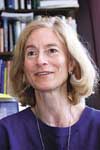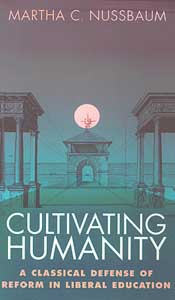Nussbaum recognized for her book Cultivating Humanity
By Peter SchulerNews Office
 Martha Nussbaum |
Martha Nussbaum, the Ernst Freund Distinguished Service Professor of Law & Ethics in the Law School, has been awarded the Grawemeyer Award in Education by the University of Louisville.
The award committee cited Nussbaum for her recent book Cultivating Humanity: A Classical Defense of Reforming Liberal Education, in which she supports an approach to liberal education she contends would make students “citizens of the world” who can think critically for themselves while being open to other’s perspectives. She argues that in order for students to achieve true world citizenship and the skills necessary to maintain democratic principles in the nation’s multicultural society, universities must offer a liberal education that does not focus only on what is important in the American tradition. They also should offer studies of other cultures and ways of thinking that enable critical examination of the status quo.
 |
Endowed in 1984 by the Grawemeyer Foundation and named after Kentucky industrialist and philanthropist Louis Grawemeyer, the award committee draws nominations from around the world. Grawemeyer’s intent was to honor individuals from the humanities, the social sciences and the performing arts who have developed great ideas that are broadly accessible and not restricted to academic discussion.
Nussbaum said she will donate the $200,000 award to charity.
Nussbaum also has appointments in the Department of Philosophy, the Divinity School and the College, where she is an Associate in Classics, and she is an affiliate member of the Committee on South Asian Studies and a board member of the Center for Gender Studies.
 |
Her most recent book, Upheavals of Thought: The Intelligence of Emotions (Cambridge, 2001), has been widely praised. In it, she argues that emotions are modes of understanding essential to ethical judgment and what she calls “full political rationality.” She offers the view that emotions are not mere inner forces that buffet us about, constantly threatening to unseat reason. They are them-selves modes of responsive intelligence that express our conscious and unconscious judgments of what we value and what we believe will promote the flourishing of our lives. “All the evaluative judgments implicit in emotions connect to specific historical, social and individual life circumstances,” Nussbaum explained.
Nussbaum believes that the development of ethical theory must include a theory of emotions. “We need to take into account the cultural sources of emotions, their history in infancy and childhood, and their sometimes unpredictable and disorderly operation in the daily lives of human beings who are attached to things outside themselves,” she said.
Nussbaum draws on the view of the Stoics that emotions are appraisal or value judgments, which ascribe to things and people outside a person’s own control great importance for that person’s own flourishing.
“We find it hard to contemplate emotions, even to acknowledge them,” she argued, “because they reconnect us with our earliest childhood experiences of shame, rage and disgust at discovering our own neediness and dependence. But denial of the emotions in ourselves and others amounts to denial of our humanity, which may have dark, even deadly consequences.” Nussbaum believes the denial of emotion can form unrealistic ideals of self-sufficiency that puts one out of touch with the interdependence that is critical to all life in society.
In her book, Nussbaum reflects on specific accounts of emotion, including a long report of her own grief at her mother’s death, and concludes that emotions “have a narrative structure. The understanding of any single emotion is incomplete until its narrative history is grasped and studied for the light it sheds on present response.”
Nussbaum’s book also is a tour d’horizon of novelists, poets, composers and others, whose experience of art she ties to a philosophy of the emotions. She laments the marginalization of the liberal arts. “The humanities and the arts are increasingly being sidelined in education at all levels,” Nussbaum said.
We should “insist that they do make a vital and irreplaceable contribution to citizenship, without which we will very likely have an obtuse and emotionally dead citizenry, prey to the aggressive wishes that so often accompany an inner world dead to the images of others. Cutting the arts is a recipe for the production of pathological narcissism.”
![[Chronicle]](/images/small-header.gif)